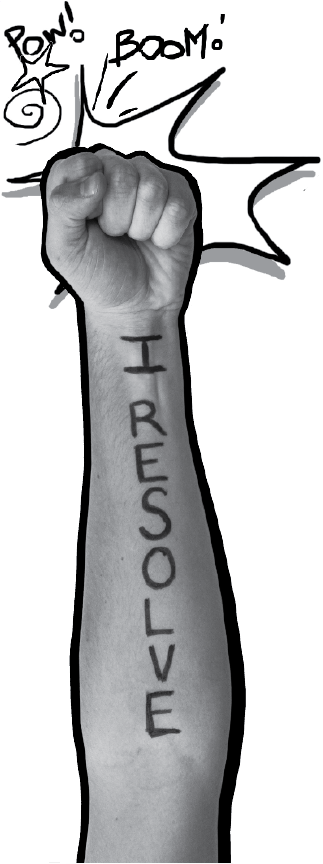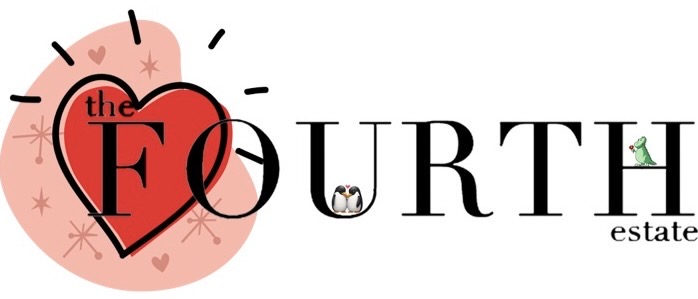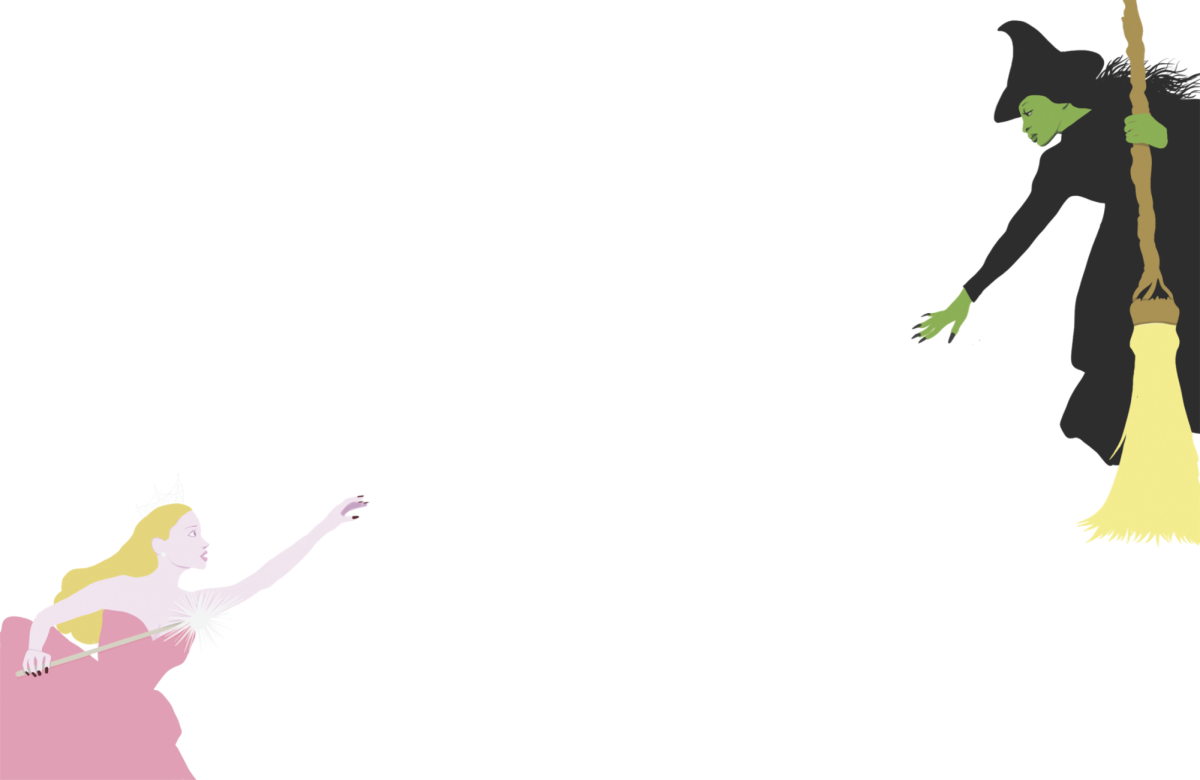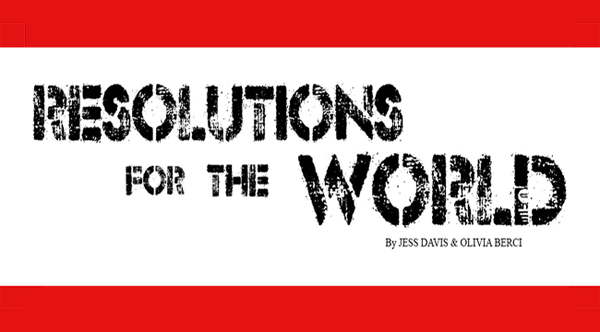A New Year brings about a new opportunity for reflection. What will 2011 be remembered for? How will I, as an individual and as a member of my generation, remember 2011? What mattered this year? What shouldn’t have mattered? In setting resolutions this year, let’s turn our eyes to the world. It isn’t fair or realistic to demand that our country’s leaders solve all of our current issues in the year 2012. As individuals and as a country, we need to focus not only on our personal growth, but also on our growth as a society. We need to learn from our mistakes and evolve. We each have the power to better our world. I resolve:

Take to the streets and to the polls:
Drug cartels, cruel dictators, income inequality, unjust autocracy, and ineffective leadership motivated millions of people throughout the world to reject traditional forms of leadership and take to the streets in protest. From the Middle East and Europe to the United States, we united against injustice. However, as alternative forms of civic engagement such as public demonstrations skyrocketed, fewer Americans voiced their opinions at the polls. Last year, populations across the globe demanded what we, as Americans, consider a right–the right to choose our leaders and hold them accountable. A democracy can only be effective if its citizens are engaged. Unless Americans of all demographics, backgrounds, and experiences vote, our government cannot adequately represent its people. As protesters in cities across the nation gathered to oppose the polarization of wealth in the top 1 percent and to demand better opportunity for the other 99 percent of the population, less than 60 percent of us participate in general elections. We value our right to demonstrate. From the inception of our country, our appreciation of free speech has been ingrained in our philosophy. However, to simultaneously protest elitist policy and to not vote is hypocritical. Let’s resolve to be engaged citizens both on the streets and at the polls in 2012.
Value the news over the Kardashians:
The Republican Presidential Debate on Sept. 10 stands as the most-watched GOP debate of the 2012 campaign season, drawing 7.63 million viewers. Socialite Kim Kardashian’s televised wedding special broke records in October with 10.5 million viewers. The E! broadcast raked in $15 million for Kardashian. How does that reflect on us as a generation? Over the past year, the media has proven itself as an incredible resource for positive social change. In TIME magazine’s Person of the Year introduction, released in late December, writer Ric Stengel wrote “technology allowed us to watch, and spread the virus of protest, but this was not a wired revolution; it was a human one”. It was the soul of those who protested that translated into the media coverage of the Arab Spring and uprisings against Mexican drug cartels. That was news that informed. It was news that inspired upward democratic movement across the globe. It was revolutionary. The year 2011 was irrefutably a wired year, but as we move into 2012, let’s maintain the integrity of the news we value. The media glorifies bad model celebrities, teenage motherhood, and $18 million weddings; is that what we value? Media moguls are out to make bank and entertain. If we care about what is honest and important that too will be rendered in our news.
Give until its gone:
After crisis, communities across our nation and globe become hyper-aware of the issues at hand and come together to aid those who have been wounded or displaced. But as time passes, we begin to mend the emotions experienced by witnessing such tragedy; our attention span wanes. Our support tapers off far before the real healing is finished. The 2011 Tohoku earthquake, tsunami, and nuclear crisis in Japan spurred a frenzied push for uniting as a student body to fundraise for victims of the disaster, but that seemed to fade all too quickly. What if we had preserved that response? This year, lets maintain our outward outlook. We should look to those times of dire need as a model of how to frame our view of giving–of community support. How can we translate that energy without a crisis to motivate us? Our own local community may not have recently suffered from a great natural disaster, but look around. I mean really look. Santa Barbara is wrought with issues of huge divide and homelessness. We need to work to mend those wounds until they are fully healed.
Lower the thermometer:
100,000 Australians were left homeless and 35 were killed after a freak storm caused the Brisbane River to flood. This tragic event was followed by a terrifying category 5 cyclone that affected people across the continent. Australians–who have first-hand experience of the dangers posed by increased world temperatures–fully understand the significance of climate change, and they are implementing innovative programs to prevent it. While the majority of Americans have finally accepted that global warming does in fact exist, many are hesitant to accept its significance. We have made some progress in the last year, and, for the first time, the majorities in both the Democratic and Republican parties believe that climate change is real (although only 34 percent of the Tea Party acknowledges its existence). Global warming is here; it is already affecting people throughout the world; and it will be one of our most daunting challenges in the next 100 years. While our government has implemented some climate change policy, we cannot only rely on leaders in Washington to solve this crisis. We all must change our lifestyles and adapt.
Wire for good:
“Welcome back Egypt #Jan25” tweeted Wael Ghonim, marketing manager at Google who became a symbol of the revolutionary movement. Ghonim was held in captivity for nearly 12 days by the Egyptian government under Hosni Mubarak for organizing protests. “Helicopter hovering above Abbottabad at 1AM (is a rare event),” tweeted a local man in Abbottabad, Pakistan who unknowingly live-tweeted the raid on Osama bin Laden’s compound. “My daughter her name is sarah m. rivera,” tweeted Daniel Morales, who was able to use a prepaid cellphone to create a Twitter account through Underheard, an initiative to help homeless residents in New York city speak for themselves. He posted his cellphone number and a photo of her at age 16 and was reunited with his 27-year-old daughter, Sarah Rivera, when she called him the next day. These are the stories that transformed the image of what social networking is and can be. When Ghonim was released, he told an Egyptian network to not focus the cameras on him. “I’m not a hero. The real heroes are the youth who are behind this revolution…we’re going to clean this country of this rubbish,” he said, “I think the most important lesson there was that you give people simple tools and they will use them in good ways.” All the good that Twitter, Facebook, and YouTube brought about this year was, unfortunately, muddled with classless acts of outward spite and ridicule. While we were using social networking as a forum for help and a mecca of information, at the same time, our generation was posting and commenting without thinking before we typed. Sitting behind a computer screen doesn’t give us an out to be lewd or hurtful. As we move into 2012, let’s maintain the constructive power of social networking and use it as a tool for uniting behind social justice.


































